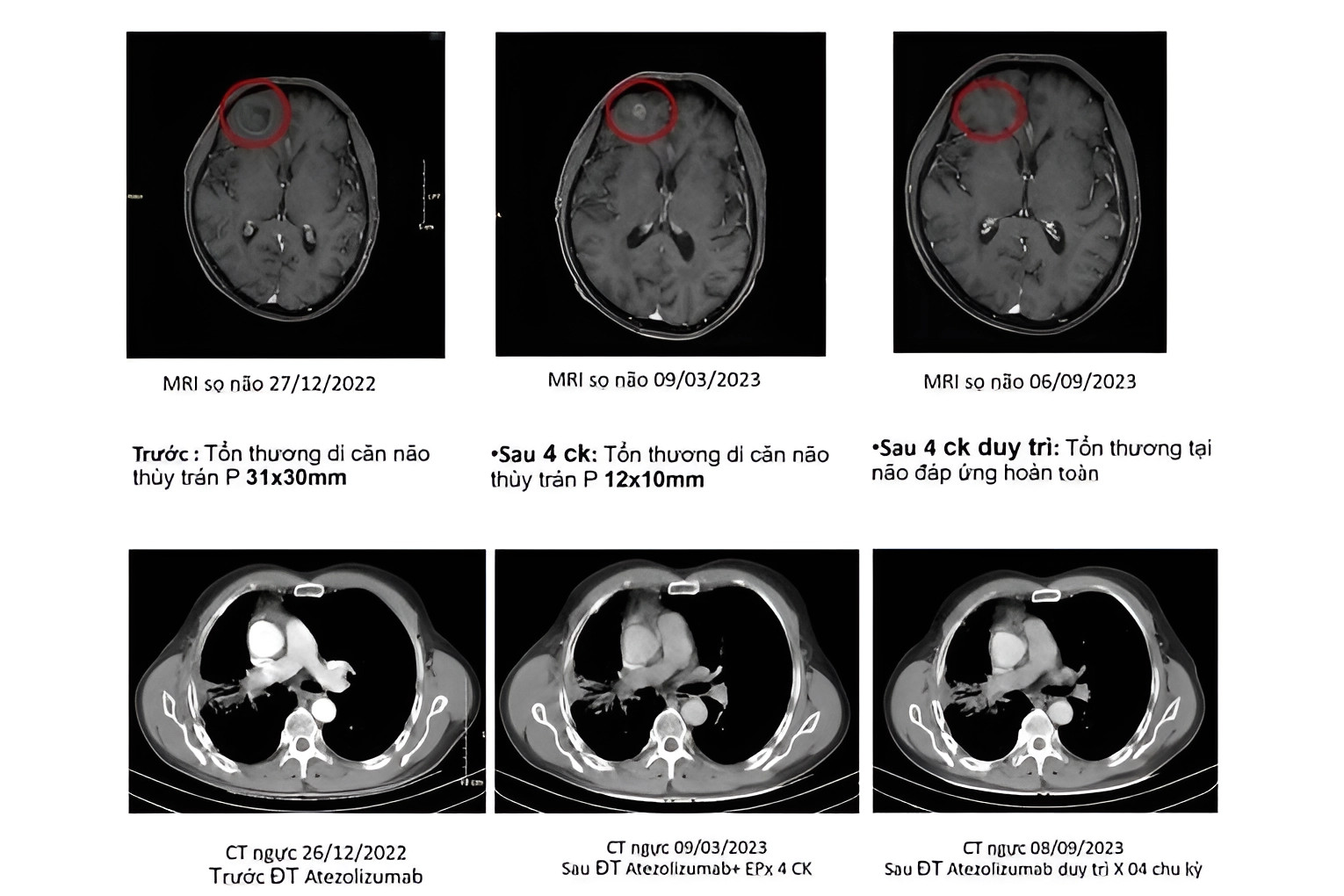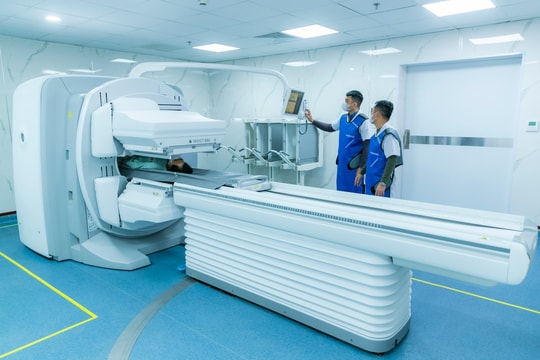New hope for patients with metastatic recurrent small cell lung cancer
(Baonghean.vn) - Small cell lung cancer is a dangerous disease with a high rate of recurrence and metastasis and a poor prognosis. However, recently, Nghe An Oncology Hospital successfully treated a patient with metastatic recurrence of small cell lung cancer with immunotherapy.
This is a new ray of hope for patients who are battling this disease.
In October 2020, Mr. CBQ (62 years old, Thai Hoa town, Nghe An) was diagnosed with localized small cell lung cancer at Military Hospital 103. After a while, he asked to return to Department of Internal Medicine II, Nghe An Oncology Hospital for treatment.
Here, Mr. Q. was consulted by the thoracic subcommittee with a concurrent chemotherapy and radiotherapy regimen. The disease responded completely, and then he received preventive radiotherapy to the brain. After being discharged from the hospital, he was monitored periodically every 3 months, and the disease was stable for 19 months.
By December 2022, the disease had relapsed and metastasized to the brain. At this time, he had a secondary lesion in the frontal lobe (right) measuring 31x30mm, the lung lesion was stable, and no abnormalities were recorded in other organs. The patient was consulted by the thoracic subcommittee. After the consultation, the doctors decided to choose the Atezolizumab immunotherapy regimen combined with the Etoposide+Carboplatin duo chemotherapy for 4 cycles.
After 4 months of treatment, the patient had positive progress. The brain lesion had significantly reduced in size (12x10mm), and the lung lesion had stabilized. Doctors assessed the disease as a partial response and continued with monotherapy for maintenance. After 4 cycles of maintenance immunotherapy, the brain lesion had completely disappeared. Currently, after 8 months of immunotherapy, the patient's health condition is completely stable, with no toxicity recorded.

Small cell lung cancer - a dangerous disease with a poor prognosis
It is estimated that each year in Vietnam there are more than 26,000 new cases of lung cancer and about 23,000 people die from this disease. Lung cancer usually has two main types, including small cell lung cancer and non-small cell lung cancer. In which, small cell lung cancer is a malignant disease with a poor prognosis, rapid progression, early metastasis, limited treatment options mainly based on chemicals and radiation. However, with recent advances, especially the advent of immunotherapy, it has contributed to improving treatment effectiveness, prolonging patients' lives, opening up new opportunities and hopes for patients.
Immunotherapy - A New Era in Cancer Treatment
Immunotherapy is a cancer treatment that uses the body's own immune system to fight cancer cells. It has been shown to be effective in treating many types of cancer, including small cell lung cancer.
MSc. Dr. Pham Thi Huong - Deputy Head of Internal Medicine II, Nghe An Oncology Hospital said that more and more patients are being treated with immunotherapy at the Hospital. It is important that patients are diagnosed accurately and intervened at the right time. Patient CBQ is one of the typical cases recorded. Thereby, it proves that immunotherapy has truly opened a new era, lighting up the hope of prolonging the life of lung cancer patients, especially small cell lung cancer - a group of diseases with a very malignant prognosis.

Good news for cancer patients
On August 15, 2023, the Ministry of Health approved a program to support the drug TECENTRIQ (Atezolizumab) partially free of charge for a number of medical examination and treatment facilities until December 31, 2024. Nghe An Oncology Hospital is one of three facilities in the Central region and one of 21 cancer treatment facilities nationwide to apply this program.
According to Master, Doctor, Doctor Nguyen Khanh Toan - Head of Internal Medicine Department II, Nghe An Oncology Hospital, cancer is a disease that requires a long treatment course with a high cost. The free drug support program for lung cancer patients will help many patients have the opportunity to access this advanced treatment method, thereby improving the quality of life and prolonging life. This is good news for cancer patients, especially those with small cell lung cancer in the recurrent and metastatic stages.





